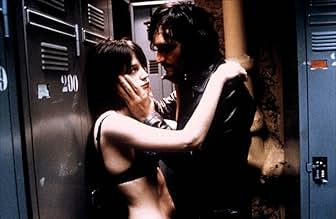IMDb-BEWERTUNG
5,9/10
10.199
IHRE BEWERTUNG
Zwei amerikanische Frischvermählte in Paris erleben eine Liebe, die so stark ist, dass sie sie fast verschlingt.Zwei amerikanische Frischvermählte in Paris erleben eine Liebe, die so stark ist, dass sie sie fast verschlingt.Zwei amerikanische Frischvermählte in Paris erleben eine Liebe, die so stark ist, dass sie sie fast verschlingt.
- Regie
- Drehbuch
- Hauptbesetzung
- Auszeichnungen
- 3 Nominierungen insgesamt
Florence Loiret Caille
- Christelle
- (as Florence Loiret-Caille)
Marilú Marini
- Friessen
- (as Marilu Marini)
Empfohlene Bewertungen
I can see why 'Trouble Every Day' divides viewers. Some find it slow, pretentious and boring, and I totally understand why. It certainly has moments that fit those adjectives, but then there are scenes of great power that really impress. It's difficult and sometimes frustrating viewing, sure, but very beautiful and brutal, and ultimately an extremely fascinating film. 'Trouble Every Day's arthouse approach to horror themes reminded me a little bit of both Abel Ferrara's 'The Addiction' and Jean Rollin's 'Night Of The Hunted', but that's just to give you an idea of the strange territory the movie enters. I can also understand where the David Cronenberg comparisons are coming from, but Claire Denis is a lot less clinical and detached. It's a very emotional movie, and a lot of that has to do with Vincent Gallo's subtle performance. Gallo ('Buffalo '66', 'The Funeral') is a controversial figure as a person, but as an actor there's no disputing his talent. His wife, played by 'Ghost Dog's Tricia Vessey, is also excellent, and Beatrice Dalle ('Betty Blue')'s performance is way out there, but it's Gallo's movie as far as I'm concerned. This movie is not to everyone's taste (no pun intended!), but if you are looking for something different and are willing to put some effort in, I highly recommend this film. There's nothing quite like it.
"Trouble Every Day" is, for me, one of the most unfairly maligned films of recent times. Surely it is the admittedly confronting content that has people dismissing this near-brilliant meditation on carnal desire, blood lust and homicidal tendencies, and not the filmmaking. There is something gratuitous about the scenes of explicit violence in "Trouble Every Day" but I see no reason why this is grounds to reject the film outright. I think everything else works pretty well from the elliptical narrative that never lets on more than it needs, the stripped and reserved performances, the suggestive camera work and the beautiful, atmospheric photography. The sense of menace created by the guttural aural track and the bloody violence suggest an unusual link between art-film and horror that is reminiscent of Cronenberg and Ferrara. One of the more compelling films I've seen in recent times.
Saw this last night and was blown away by it. For me it played as an intense psychological study of infidelity and addiction. The performances are taught and understated, as is the direction, with attention often focused on minute details.
I've seen negative reviews of this film from two different perspectives. One is the art-house maven who feels the scenes of sexual violence are gratuitous and in poor taste; Kevin Maher's comments in the Guardian are an example. Once these reviews have had an airing they tend to attract gorehounds, some of whom (going by online reviews) had been led to expect a genre movie and were disappointed. Hence you get a lot of complaints about slow pace, unresolved endings, lack of gore etc etc.
The movie does contain some quite disturbing scenes, but they serve to heighten the emotional drama that the film's really about rather than being an end in themselves. You've probably seen plenty of things more graphic than this without straying into the outer reaches of the horror genre. The sexualisation of the violence does make it more potentially upsetting, as does the psychological context Denis so delicately builds up.
As other reviewers have said, this isn't supposed to be a plot-driven action movie, but the storytelling is impeccable. The ambiguous ending is absolutely logical, and people who say it "doesn't end properly" astonish me. The ending makes perfect sense in light of everything that's gone before.
The back-story about the pharmaceutical company etc is pretty cheesy, but it helps to have some kind of nod towards an explanation for what's happened to the lead characters, and that's really all it is.
I think this one is going to stay with me a long time and I'd definitely re-watch it.
I've seen negative reviews of this film from two different perspectives. One is the art-house maven who feels the scenes of sexual violence are gratuitous and in poor taste; Kevin Maher's comments in the Guardian are an example. Once these reviews have had an airing they tend to attract gorehounds, some of whom (going by online reviews) had been led to expect a genre movie and were disappointed. Hence you get a lot of complaints about slow pace, unresolved endings, lack of gore etc etc.
The movie does contain some quite disturbing scenes, but they serve to heighten the emotional drama that the film's really about rather than being an end in themselves. You've probably seen plenty of things more graphic than this without straying into the outer reaches of the horror genre. The sexualisation of the violence does make it more potentially upsetting, as does the psychological context Denis so delicately builds up.
As other reviewers have said, this isn't supposed to be a plot-driven action movie, but the storytelling is impeccable. The ambiguous ending is absolutely logical, and people who say it "doesn't end properly" astonish me. The ending makes perfect sense in light of everything that's gone before.
The back-story about the pharmaceutical company etc is pretty cheesy, but it helps to have some kind of nod towards an explanation for what's happened to the lead characters, and that's really all it is.
I think this one is going to stay with me a long time and I'd definitely re-watch it.
This movie is up until now the dullest and most boring movie of the Stockholm Film Festival. It is not touching, not moving, not repulsive, not anything, just boring. Slow and completely void of story and character development, it leaves me feeling empty. Lesson for the movie-makers: Just throwing in some blood and unnecessary rape doesn't take away that this is 100 minutes of nothing.
Crap I say.
Crap I say.
Although there are a few scenes that are very, very striking (the gore and the sexuality), the movie just left me wondering "what was this all about?". There are no explanations for any of the events that take place and we never get any insight into the characters. It was as if I was observing a couple of very disturbed people but I was not allowed to ask questions and no information is available. I was disappointed.
Wusstest du schon
- WissenswertesBéatrice Dalle has stated this is her personal favorite of her films.
- PatzerAt time-stamp 56:49, a face (presumably the crew since no one is in the house) can be seen reflected in the glass door/window on the right of the screen.
- VerbindungenFeatured in Snuff: A Documentary About Killing on Camera (2008)
Top-Auswahl
Melde dich zum Bewerten an und greife auf die Watchlist für personalisierte Empfehlungen zu.
- How long is Trouble Every Day?Powered by Alexa
Details
Box Office
- Bruttoertrag in den USA und Kanada
- 9.189 $
- Eröffnungswochenende in den USA und in Kanada
- 2.984 $
- 13. Okt. 2013
- Weltweiter Bruttoertrag
- 15.571 $
- Laufzeit1 Stunde 41 Minuten
- Farbe
- Sound-Mix
- Seitenverhältnis
- 1.85 : 1
Zu dieser Seite beitragen
Bearbeitung vorschlagen oder fehlenden Inhalt hinzufügen






































